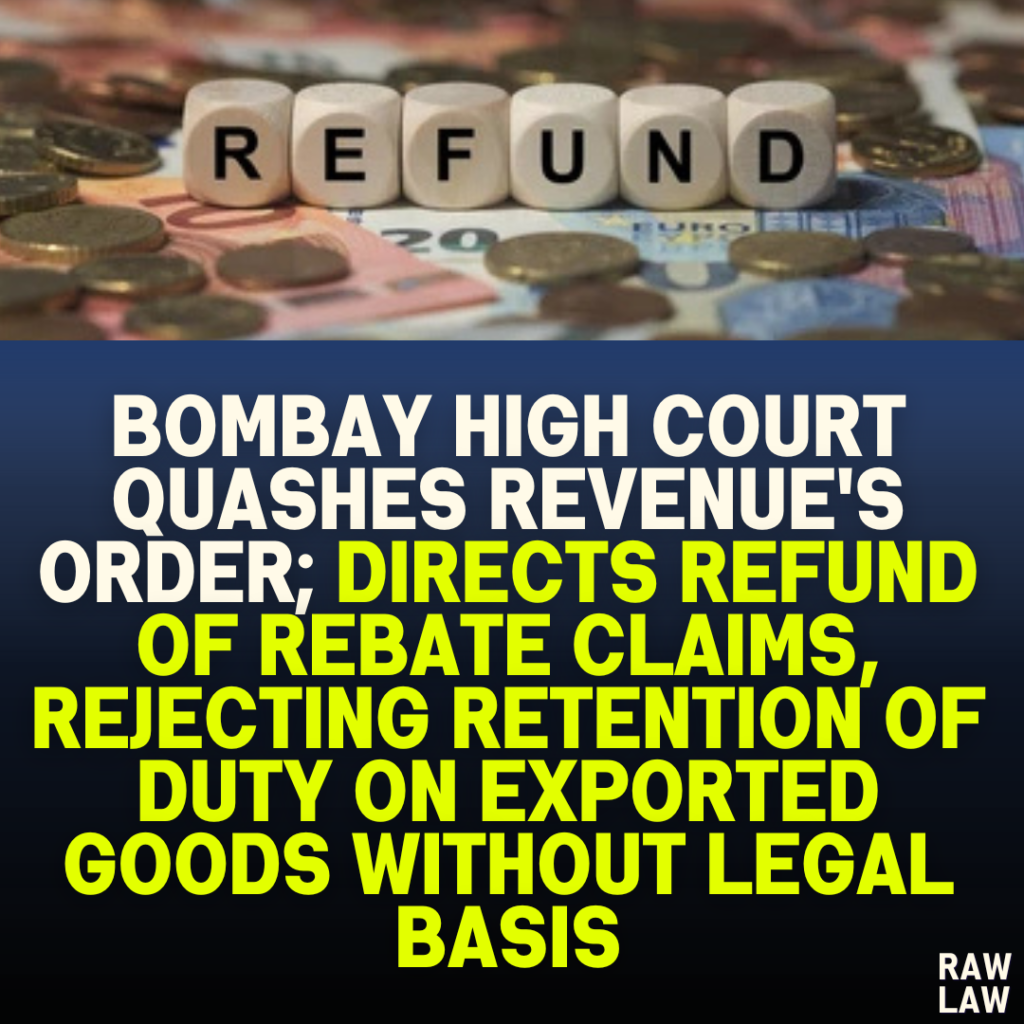Court’s Decision: The Bombay High Court quashed the order passed by the Revisional Authority and directed the refund of the rebate claims under Rule 18 of the Central Excise Rules, 2002, holding that the revenue had no authority to retain the duty paid by the petitioner. The Court observed that the goods exported were not eligible for the exemption under Notification No. 3/2006 and that retaining the duty without legal authority was unconstitutional.
Facts: The petitioner, engaged in the manufacture of biscuits, cleared the products for both home consumption and export. For the biscuits exported, the petitioner claimed a rebate of excise duty paid. The exemption notification (No. 3/2006-CE) applied to goods with a per kg. retail sale price not exceeding Rs. 100/-, but the biscuits exported did not bear such a retail price, as required under the Standards of Weights and Measures Act. The Assistant Commissioner denied the rebate, claiming that the biscuits were exempt from duty, and the Revisional Authority upheld this decision. The petitioner challenged this reversal, arguing that the goods exported were not exempt under the notification.
Issues:
- Whether the biscuits exported by the petitioner fell under the exemption notification.
- Whether the revenue was justified in retaining the duty paid by the petitioner.
- Whether the rebate claim under Rule 18 of the Central Excise Rules was valid.
Petitioner’s Arguments: The petitioner argued that the exemption notification did not apply to exported goods, as the retail sale price condition was not met. They contended that they were entitled to a rebate for the duty paid, as the revenue had no authority to retain the amount. The petitioner also highlighted that similar claims had been allowed in the past and relied on previous appellate decisions.
Respondent’s Arguments: The revenue contended that the petitioner was not required to pay duty on exempted goods and, as such, was not entitled to a rebate. They argued that there was no provision for refunding the duty paid in such cases and relied on a past decision of the Bombay High Court (Mahindra and Mahindra Ltd.) to justify their stance.
Analysis of the Law: The Court analyzed the exemption notification, concluding that the biscuits exported did not meet the criteria for exemption, as they did not have a retail sale price per kg. under Rs. 100/-. Therefore, the petitioner was right in paying the duty and claiming a rebate. The Court also referred to the Central Board of Excise and Customs (CBEC) guidelines, which confirmed that MRP provisions do not apply to exported goods. The Court found that the revenue’s retention of the duty was contrary to Article 265 of the Constitution, which prohibits the collection of taxes without authority of law.
Precedent Analysis: The Court referred to several judgments, including Ravi Foods Pvt. Ltd. v. Commissioner (Appeals), Repro India Ltd. v. Union of India, and Suncity Alloys Pvt. Ltd. v. Commissioner, where similar rebate claims were upheld despite revenue’s arguments regarding exemption. The Court found that these precedents supported the petitioner’s claim for a rebate.
Court’s Reasoning: The Court reasoned that if the revenue’s contention that the goods were exempt was accepted, then retaining the duty would amount to an illegal collection without authority. The Court emphasized that the exemption notification did not apply to the petitioner’s exported goods, and the duty paid was not exempt. Furthermore, the petitioner had consistently received rebates in similar cases, and the revenue had accepted those orders on merit, which further justified allowing the present rebate claim.
Conclusion: The Court allowed the petition, quashing the Revisional Authority’s order and directing the revenue to refund the rebate claims. The Court held that the goods exported by the petitioner were not exempt under the relevant notification, and thus the petitioner was entitled to a refund of the duty paid.
Implications: This decision reinforces the principle that taxes and duties must be collected with proper legal authority. It also clarifies that goods exported without satisfying exemption criteria should not be treated as exempt, and taxpayers cannot be denied rebates for duties paid in such cases. The ruling provides a precedent for similar claims and strengthens the legal framework surrounding export rebates under Central Excise laws.
